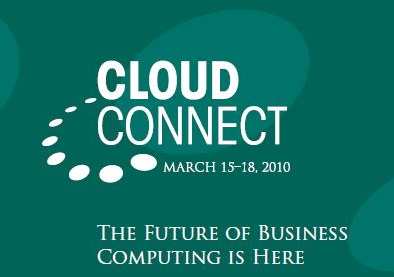Cloud Connect
March 7, 2010
 Cloud Connect brings together the entire cloud eco-system to better understand the transformation we’re experiencing and promises to be the defining event of the cloud computing industry.
Cloud Connect brings together the entire cloud eco-system to better understand the transformation we’re experiencing and promises to be the defining event of the cloud computing industry.
TechWeb has successfully produced cloud events intended to define and frame cloud computing discussions for business technology executives, IT professionals and developers since June 2008. Part of TechWeb‘s family of global brands, Cloud Connect is the only event to bring together the entire cloud computing ecosystem, creating the most efficient and effective platform to drive growth and innovation.
Through panel discussions, hands-on demonstrations, insightful speakers and candid interviews with the people shaping the cloud computing industry, Cloud Connect is the meeting place for the cloud technology community and provides the forum for the most powerful cloud innovations and solutions the industry has to offer.
Learn about all the latest cloud computing innovations in the Cloud Connect conference—designed to serve the needs of IT professionals, executives and developers—and learn about the latest cloud technologies and platforms and identify opportunities in the cloud.
What Is Cloud Computing?
By Alistair Croll, Conference Chair, Principal Analyst at Bitcurrent
Cloud computing is an umbrella term for delivering computing platforms on a pay-as-you-go basis. It’s widely used to describe everything from virtualized managed hosting, to software-as-a-service providers, to everything in between.
Economically, cloud computing is simply standardization. Cloud providers get economies of scale they can pass on to users, and have the ability to quickly allocate resources to customers. This means that they can offer dramatically shorter contracts — charging by CPU-hour or gigabyte instead of by month or cage.
Technically, cloud computing is abstraction. The cloud abstracts out certain functions — storage, for example — and the cloud’s user doesn’t care whether the data is stored on a hard drive, in memory, or in a box buried in the earth, provided that it behaves reliably. Recent advances in virtualization, combined with the broad adoption of a few programming languages and HTTP as a universal front-end, make this achievable. Beyond this definition, however, there’s a lot of contention. Every vendor is trying to cloudwash their offerings. SOA companies are claiming clouds are SOA; management companies are claiming they manage clouds; and on-premise data center technology is claiming it’s a “private cloud.”
One thing’s for sure, however — once you cut through the hype, computing as a utility has its place in the CIO’s toolbox and promises to change how we think about buying and using IT.